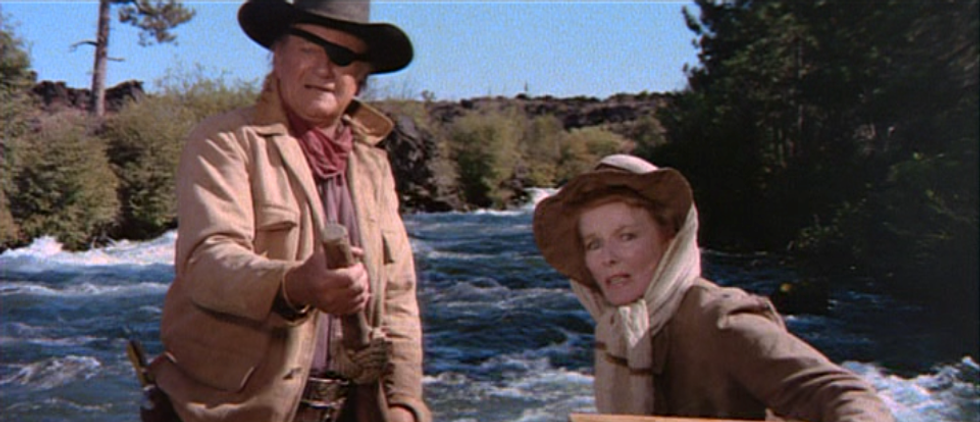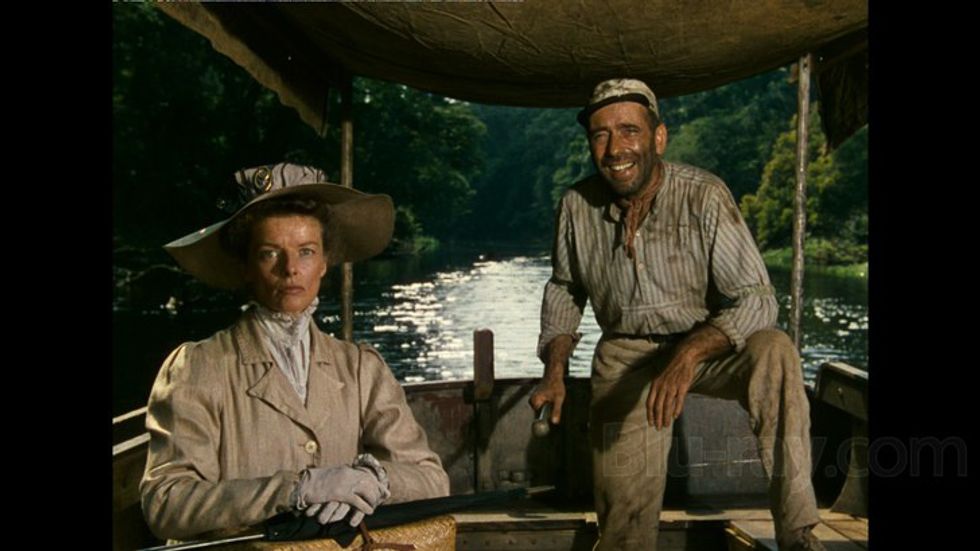Just one look at Tura Satana's bustier-than-life go-go dancer Varla relegates the 1965 film Faster, Pussycat! Kill! Kill! to the lowly status of a sexploitation movie; from the start, it is unable to regard the entire package as anything but a novelty. In spite of, or perhaps because of its notorious critical failure, it has often been reexamined by critics and, over time, has garnered high praise from feminists and film critics alike.
Life's funny like that sometimes.
Like the works of Edgar Allan Poe or Vincent Van Gogh, a movie is sometimes unfairly labeled as "bad," and shunted aside for the next week's new release. It gets filed away as a dud and, for every Faster, Pussycat!, there are dozens of rhinestones-in-the-rough which are forgotten about. It is my hope to dust off these cinematic crap fests and try to salvage them in my own fledgling series I've so cleverly named "Redemption".
The first movie I will be dredging up is the 1975 "classic" Rooster Cogburn ( ... and the Lady), starring John Wayne (reprising his Academy Award-winning role as one-eyed U.S. Marshal Rooster Cogburn) and three-time Oscar winner Katharine Hepburn as, *gasp*, another iron-willed spinster.
Right off the bat, it's impossible not to compare this film to its much stronger predecessor, True Grit (1969), as well as the entire second half of Hepburn's career. In his original review (in which he gave the movie an embarrassingly low one-star review), Roger Ebert claims that the "problem with Rooster Cogburn is that those memories become mostly painful. We remember Hepburn in The African Queen and Wayne in True Grit, and then we've got to watch the actors themselves conspire in a ripoff of some of their finest moments."
With The African Queen and True Grit both standing as hallmarks of their respective careers, it becomes impossible to watch and critique this sans bias, and so I won't even try.
The opening scenes are centered around Rooster Cogburn's unorthodox and brutal style of Old West justice, capitalizing on the audience's familiarity established by the highly successful True Grit. After this trip down memory lane, Hepburn's character, the missionary Eula Goodnight, is introduced, and, in a complete and total departure from her role in The African Queen, she is not the sister of a missionary but rather the daughter of one.
The rest of the hour and forty-five minutes are spent on a nonsensical plot surrounding a groups of criminals and stolen nitroglycerin, but the most infuriating aspect of the entire film is that, eventually, the leads eventually find themselves on a boat packed with explosives and sailing down raging rapids, a cloyingly, frustratingly obvious reference to The African Queen.
In one of the few deviations from either of the previously mentioned movies, the two do not become a happily wed couple, but instead end the film as the best of friends.
Final Verdict: Kate and John have terrific chemistry, that much is undeniable and totally unsurprising. But while they both bring tremendous gravitas to the screen, the whole movie is, from start to finish, nothing more than a compilation of their greatest hits. Any more stars than the one awarded it would be based solely on the credentials of the two long-established and esteemed leads; there is nothing innovative, or for that matter particularly engaging to be found, and the whole thing serves as a testament to the quality and enduring legacies of (say it with me now) True Grit and The African Queen. This clumsy pastiche should never have seen the light of day. Redemption denied.























